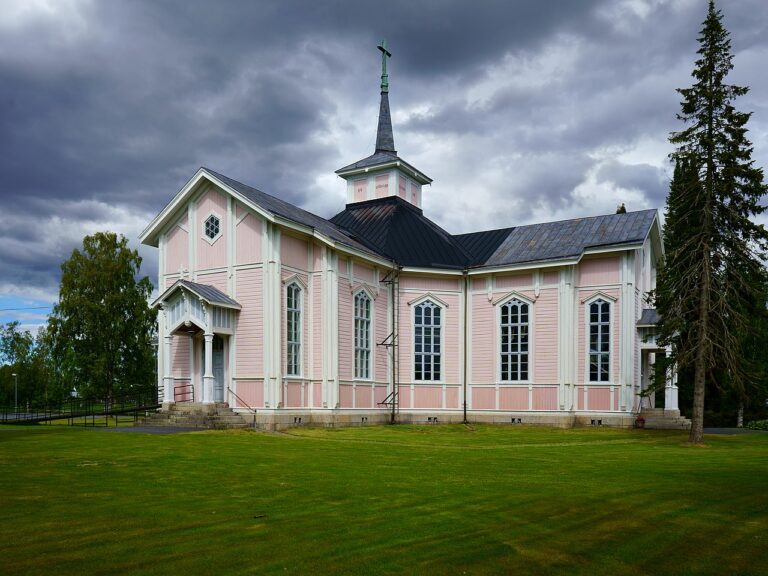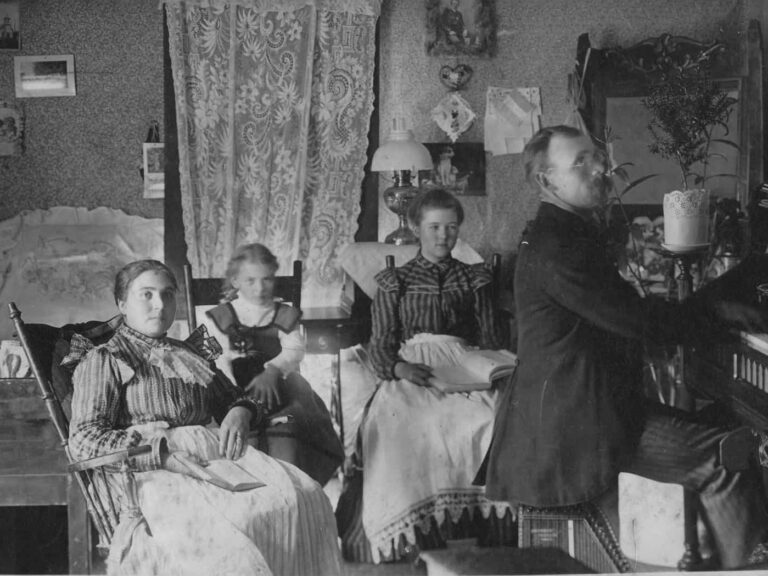This is the story of the life of Aina (Teeri) Maki Nyman, born in Kampinkyla, Kurikka, Finland on 1 January 1907. Aina died at age 85 on 2 August 1992 in Ironwood, Michigan. The story was submitted by her daughter Faye Nyman Fitzgerald.
The story appeared in the Finnish American Reporter, October 1998.
June Pelo
In my earliest memories we lived in a small home in Kampinkyla, Kurikka. Father Isaac Teerimaki left for America in 1910 when I was three years old. He left behind my mother, my sister Lydia almost five years old, me, and baby sister Alma, a few months old. My father went to America to search for a better life, and would send for us as soon as possible. We lived at his parents’ home with Grandmother Liisa (Grandfather Samuel Teerimaki had died a year earlier) and with father’s youngest sister Matilda (my aunt). It was a one big room log house with two “kamaris” (bedrooms) added on that didn’t have a way to heat them.
The tupa had homemade beds. The upper bunk of the large bed was for us, and the lower bunk was for Mummu who was very arthritic (bedridden all of my memory) but very authoritarian – she ruled from her bed. She loved to touch us, but a cry of pain followed our childish approach near her bed. I can remember the odor of lambs’ wool mixed with a warm odor of a sickbed. We loved especially the yogurt “filia” and special treats my maiden aunt Matilda “Tilda” fixed for us. She was chosen to stay home and take care of her mother, being the youngest. Two of her sisters had gone to America, and another left home early. Aunt Tilda was still very bitter about having to waste her life when all the rest had enjoyed the world outside. She was 75 years old when I visited her in 1966, and lived only two more years after that. Grandmother ruled like a tyrant from her sickbed!
We moved to our own first home, the small house to be our own on the edge of a forest. Facing toward grandmother’s was a big open-quilt pattern of meadow, cultivated with grain field and pastures with clusters of farms. My safe security was short lived – father met with hard times in America during the 1912-13 “poor time” and he couldn’t pay the mortgage, so we lost that first happy haven where my mother had been happy for the first time, being on her own away from her mother-in-law. Mother had a difficult, loveless life, working for the landowners in field and their houses. She was able to learn the intricate weaving of designed window curtains, wool and flax cloth and figured cottons and care for us three small girls. I forget the name of the family that took us in when our house was taken by the mortgage holder. I’ll never forget the pain and panic when they nailed the boards on the windows. I still cry as I did 75 years ago. We moved again! A family took us in. We had a bed to sleep on and food – mother always worked in the field or with wool in the winter. Grandmother Lehtinen (mother’s mother) lived with Uncle Franz (he was the only son), and they took us in. Little sister Alma died – she wasn’t two years old yet. Uncle Franz and Hilja Latvaluopa got married (Aina attended this wedding and had a photo – the bride wore a black dress.) We moved to a small shack-like house with one room – always waiting to start our America trip. Only small amounts of money came from our faraway father in America. I was five years old when the Titanic sank in the Atlantic.
Finally, our trip to America seemed close. Our excitement was beyond control, although mother’s attitude puzzled us. All hope shattered with news of war. A member of royalty was shot in Eastern Europe on 28 June 1914; a Serb assassin in Sarajevo shot Archduke Francis Ferdinand of Austria-Hungary, which marked the beginning of World War I. The British ocean liner Lusitania was sunk by a German submarine off Ireland 7 May 1915.
No passenger travel was allowed on land or ocean. The following years were most disappointing and heartbreaking. Some food was rationed – flour, sugar, soap. Coffee was out of the question. Mother worked for wealthy landowners, mostly for food – milk potatoes, flour. She got a job as cook and housekeeper for a family. The lady was bed-ridden with tuberculosis. One of us could stay with her by turns. I stayed with Aunt Amanda, cared for babies – she had seven children. She was cranky, nervous. Her husband, folks said, was a ne’er-do-well, who worked in the woods. That summer was hard to live through. My sister Lydia and I got to stay at the wealthy home with mother in order to go to school close by.
Mother bought a house, a board shack that was cold in winter. It also had only one room. Our home – finally! We were approaching teenage. We went to school, and helped to earn shoes by watching cows, baby sitting, picking berries, and gathering twigs and branches (as allowed) from the forest, as well as pine cones for warmth and light by the open fireplace. The shoes were simple moccasins, made by the shoemaker on lasts to each measured foot. The smell of leather, its tan color waxes, polishes, the “pikilanka” on two needles sewed on both sides of the seams (with both hands sometimes) shaped on the last, paddled with a greasy looking wood mallet. Wood nails that looked square to me, the shoemaker “suutari” spit out one nail at a time from a mouthful. Always a lot of wooden tool kits, lasts, black wax and bits and stacks of leather around him. Dressmakers sewed to measurements – never used patterns. We just showed the style we wanted. Cloth was home grown wool or flax, hand-woven. One summer when I was ten, I watched cows for neighbors – three cows, two calves. Each fall I helped other kids round up sheep from the open range. To identify them, the sheep’s ear was notched with a brand. I earned one pair of “pieksut” moccasins.
At age 11, I lived three summer months with a family of a wealthy landowner who was an Evangelist preacher. I watched a herd of cows and cooked small new potatoes in a three-legged cast iron pot near the low wet spot with willows.
Finland’s civil war – class struggle, whatever it was called – started in 1918-1919. World War I was ending with the Russian Revolution and Europe’s awful turmoil. Finland was at war, brother against brother, which lasted a year. No actual battles occurred in our village, but people disappeared. There were whispers, fears and confusion. The men joined red or white armies. Trainloads of widows, “punakaartin leskia,” and orphaned children were brought in. Children were placed in homes, some in orphanages. Women prisoners were held in the Labor Hall. One day we were near the church and saw soldiers marching the women to a clubhouse for their noon meal.
World War I ended. Once again father sent money for our tickets to America. Mother got passports, doctor certificates, clothes, fixed bags, made endless arrangements.
Immigrating to America!
I looked through the eyes of an idealistic 13-year-old girl. The year was 1920, the last week of August. My sister Lydia and I grabbed our bags which had been packed by mother, who had left a week earlier for the last check of travel arrangements – tickets, passports, money. Aunt Hilja gave Lydia and me a bouquet of pretty summer flowers as we boarded the train at the Kurikka railroad station. We spent a day in Helsinki and then we were off to Hanko Harbor to board the Arcturus ship for the first ever ocean travel experience. The North Sea, “Pohjam Meri” was at its worst! A storm that seemed to toss us continually in every direction. It was loaded to capacity and almost everyone was seasick. The deck was slippery with food that didn’t stay in the stomach when we raced for the edge rail for relief. We arrived in London, and the sea was calm. The famous big city with its double-decker buses and horses with the biggest hoofs I had ever seen – their sound filled the streets.
We waited for hours in a warehouse-like holding area teeming with swarms of refugees running from revolutions; third class, primitive. It was an overnight train ride to Hull where the gigantic ocean liner, Cunard’s finest Aquatania with four smoke stacks awaited. The voyage took two weeks or longer. I got tonsillitis and was awfully sick. I stayed in our stateroom most of the first part of the trip. People were dancing, being entertained and friendships were born on that over-crowded deck – there were three classes on different levels.
Finally, we arrived in America. I crowded in front of the ferry boat to see the Statue of Liberty and recited to myself the inscription of Emma Lazarus’ poem, “Give me your poor” in Finnish, of which I later lost my copy. But we weren’t taken to this enchanted skyscraper city of New York. We were herded onto Ellis Island like cattle. Now I really saw the hundreds of Eastern European refugees in the less-civilized mode. They pushed, rushed getting ahead of others – maybe panicked lest they be sent back. There were roped-off areas and roped-off lines which guards herded you into for yet more examinations. The eyes seemed to be turned inside out. Fear and nervous dread gripped me each time.
Will they send me back because I was sick? It seemed as though the Finnish interpreter was never around and this human mass of many nationalities milled around, some very rude, eyeing around to our corner, which was to be “our spot” for ten days, because my sister Lydia came down with bronchitis and they took her to a hospital or infirmary. Mother waited the whole day to find out about her. The wait was the worst experience of the trip. We were herded to the second story to eat, and were handed a loaf of white bread and two eggs, which you hung onto or someone across the table grabbed it! They took us to the third floor, the women’s and children’s sleeping hall, with steel cots – stacked two and three high. Mother was a miracle! She remembered our assigned cots, and the assigned seats in the dining room which could hold 1,200 at a seating.
Needless to say, I had hair and body lice and the misery of the bathroom grew worse; those refugees used the floor, the excrement was all over the toilet – wherever you found a clean place to step was a success! They hosed it often and this big hall had a hundred or more toilets.
One morning I found that our bag of nice clothes and hats which Lydia and I were to wear to meet our father, gone for ten years, had been stolen. Finally, my sister was back and we were taken to New York and boarded the train to Chicago and then on to Ironwood, Michigan. We arrived in Ironwood on Labor Day, 5 September 1920.
Mother was disappointed with Ironwood and its ore colored streets and mud. Father Isaac had a home waiting for us in the country.





